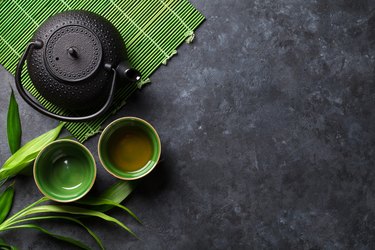
Everywhere you turn, you see green tea in different forms, all hailed for providing health benefits — not only tea bags but also green tea extract capsules and topical products. These are great if you respond well to green tea, but what if you have a green tea allergy?
Only a doctor or health care provider can determine whether you have an actual green tea allergy, but there are symptoms you can look out for. The good news is that being allergic to green tea is not common. Green tea might even be good for relieving symptoms of other allergies.
Video of the Day
Video of the Day
Read more: 5 Unexpected Benefits of Drinking Matcha Tea
A Green Tea Allergy
Awareness of allergic reactions to green tea rose after a study published in October 2003 in the Journal of Allergy and Clinical Immunology looked at 11 patients who worked at a Japanese green tea factory and developed nasal and asthmatic allergic reactions between 1984 and 2001. Their symptoms included cough, dyspnea (difficulty breathing) and loss of consciousness (in severe cases).
In some, but not all, of the workers, symptoms also manifested after ingestion of any type of tea (green tea, oolong tea or black tea) or after they ate cakes or noodles made with green tea powder. Skin tests and inhalation challenges confirmed the patients developed asthma that was induced by green tea inhalation or ingestion.
However, many of the patients showing allergic reactions to green tea had consumed green tea in the past without an allergic reaction. This green tea allergy, therefore, might have been caused by inhalation of green tea dust while on the job.
But in other cases, green tea might be helpful in fighting allergies. Specifically, green tea might help itchy skin. In a study published in June 2012 in Toxicology Research, a small group of 10 healthy volunteers were tested for how green tea, when used topically, could affect their allergic contact dermatitis, a common skin disorder where contact with certain chemicals, including those in cosmetics, hair dyes, hand washes and so forth, causes an allergic reaction.
Throughout the test period, green tea did not irritate the skin of the test subjects; more importantly, it had a positive effect in managing their allergic reactions. However, it did not seem strong enough to control moderate or severe reactions, so you might not be able to count on green tea for itchy skin as a complete cure.
The study concluded that green tea was safe both in cosmetics and in medicinal applications; therefore, you at least can rest assured green tea won't make itchy skin any worse.
Green Tea’s Other Health Benefits
It's not merely in topical use that green tea has benefit in fighting allergies. AARP recommends green tea, specifically a type called Benifuuki, as a method to offset such symptoms as stuffy nose and itchy eyes.
Additionally, the University of Rochester Medical Center explains that green tea has more polyphenols and antioxidative properties than black and oolong tea, and it may reduce the risk of some cancers. And green tea's bad side effects are very minimal. Because it does have small amounts of caffeine, excess consumption can lead to anxiety, tremors, irritability and sleeping problems.
More benefits to green tea are continually being discovered. The National Center for Complementary and Integrative Health (NCCIH) notes that it is funding research on green tea's ability to combat iron overload disease and to help people who are HIV positive.
Other green tea bad side effects might include liver problems caused by green tea extracts sold in capsules, according to both the National Center for Complementary and Integrative Health and the University of Rochester Medical Center. NCCIH lists symptoms of liver problems as abdominal pain, dark urine and jaundice.
So unless you have a green tea allergy, you can — for the most part — expect green tea to be good for you and offer many health benefits. If you find green tea has bad side effects for you, talk to your health care provider about your symptoms.
- University of Rochester Medical Center: “Green Tea”
- National Center for Complementary and Integrative Health: “Green Tea”
- Toxicology Research: “Human Skin Safety Test of Green Tea Cell Extracts in Condition of Allergic Contact Dermatitis”
- AARP: “Soothe Your Allergies”
- Journal of Allergy and Clinical Immunology: “Food Allergy to Green Tea”
Is this an emergency? If you are experiencing serious medical symptoms, please see the National Library of Medicine’s list of signs you need emergency medical attention or call 911.